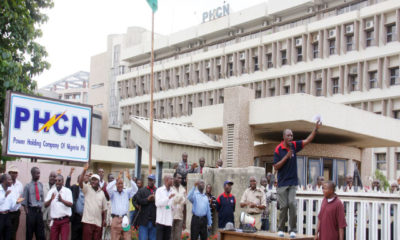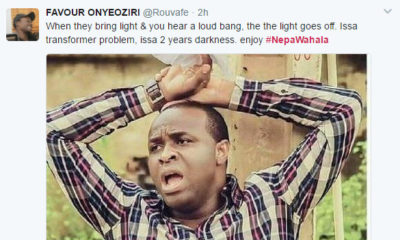Features
Kate Nkechi Okoh: When Will the Lights Stay On?
 Anecdote
Anecdote
Registrar, call the next case on the cause list, the judge said. This was the 19th case on the cause list sometime in 2012 at the High court, FCT Abuja – at about 6pm going to 7. The preceding and penultimate cases were trial cases that had taken so long and ran late into the afternoon, but still the judge was determined to hear all cases and decongest his cause list.
The courtroom was warm, as the generator had been turned off since it was past the official closing hours of the court. The judge further ordered all Counsel to take off their wig and gown, as the heat in the room was unbearable. In what followed as a joke – a serious joke, the judge requested for a table lamp. All these orders from the judge were the effect of the sad reality staring us in the face.
At this point there was mild hysteria in the courtroom; the question on the lips of everyone was how bad can it get? When will the lights come on? The question on my mind as a new wig wasn’t just when the lights will come on, but when will the lights stay on?
This was a courtroom, what happens in emergency, labor and theatre rooms in the hospitals where life is at stake?
In fact, to demonstrate the gravity of the situation, people have attributed the epileptic power supply in Nigeria to a spiritual problem and sought heaven’s intervention for a solution to the crisis by holding a Power Sector Prayer Conference from 25th-27th June 2009. This has not yielded much result, and fast forward to 2017, there is still incessant power failure.
Background
The history of electricity in Nigeria dates back to 1896 when electricity was first produced in Lagos, 15 years after its introduction in England.
Of all the discoveries of modern science in the last millennium, the discovery of electricity by Michael Faraday and its commercial production by Thomas Edison of the United States of America is said to have incredibly transformed and altered the outlook and lifestyle of modern man the most.
Electricity generation and consumption had become the indices for measuring the development in modern societies. The classification of nations into developed, developing and subsistence economies is directly or indirectly linked to the aggregate production and consumption of electrical energy. Therefore, it has become imperative for any nation that aspires to join the league of developing and eventually developed economies to map out strategies for providing adequate or optimum electrical energy supply for a total transformation of her citizens’ living standard, as well as industrialization.
…. With all said and done, what is the problem in Nigeria?
There are technical and commercial challenges inherent in the system. In Nigeria, it is estimated that a total investment of approximately USD$3.05 trillion (approximately ₦485 trillion) is required to deliver quality infrastructure across varied sectors of the economy. 33% of this sum is required to develop the energy sector to its optimal capacity/potential.
Notwithstanding the electricity reforms in 2001 vide the introduction of the National Electric Power Policy (NEPP) and the privatization of the sector in 2013 (described as one of the world’s largest privatizations and a landmark achievement to stem the tide of epileptic power supply in Nigeria) there are still incessant power outages.
Technically speaking, Nigeria – with a population of about 180million people has an installed electricity generation capacity for supply to the national grid of 8,644 MW, with available capacity of only approximately 3,200 MW, to cater for the needs of Nigeria’s population due to transmission issues at the grid. By way of comparison, South Africa has an installed electricity generation capacity for supply to the national grid of over 52,000 MW with a population of only about one third the size of Nigeria’s.
Commercially, there is severe illquidity in the sector. In a two-day interactive power sector workshop, organized by the National Assembly in February 2017, it was stated that the sum of ₦2.74 trillion has been spent on the sector from 1999-2015. The Energy Market And Rates Consultants (EMRC) disclosed in its 2016 Quarterly Market Review that the total sector deficit is conservatively estimated to be ₦809 billion at the end of 2016 and it is presently growing at around ₦40 billion/month. There is so much debt and unaccountability in the sector, that the funds injected into the sector have had minimal effect.
…The way forward
- There is urgent need to tackle shortfalls in payments, which has resulted in illiquidity in the sector. It is heart warming to know that the Federal Government on 1st March 2017 approved ₦701 billion as Power Assurance Guarantee for NBET to reduce the illiquidity problems in the sector. It is sincerely hoped that the funds are applied judiciously, coupled with effective management, monitoring, transparency and accountability.
- Having a cost reflective tariff that is regulated by forces of demand and supply cannot be over emphasized, as it will also reduce illiquidity.
- Industry agreements must be activated and enforceable to give sanctity to contracts.
- Considering the demand for electricity has been on a consistent rise without a corresponding supply ability, it is pertinent to tackle gas-pricing and supply issues forthwith (including pipeline vandalism in Southern Nigeria) to improve capacity in generation.
- Also, the transmission network should be completely privatised for the purpose of overhauling and rehabilitating obsolete machines as well as building new transmission lines to minimize transmission issues, which impede the capacity recovery plan of Generation companies (GENCOS).
- Embedded and captive generation should be encouraged to reduce heavy reliance on the grid.
- Further, metering of all customers by the Distribution companies (DISCOS) will ensure proper monitoring of funds.
- While the regulator – NERC must have the will to exert its independence and dish out sanctions when needed; the bulk trader – NBET, as an off taker and revenue gap filler must live up to its responsibility to ensure liquidity in the market.
- There must be discipline amongst market participants to perform their duties efficiently.
- There must also be a renewed sense of commitment on the part of the government not to play politics with the sector.
- The consumers are not left out; they must shun sharp practices such as vandalism; illegal connections; power theft; non-payment of bills and they should be sensitised on the need for power conservation.
Conclusion
It is my hope that the reform process is successful to achieve maximum electricity output that can satisfy the entire populace. The impact of this will transcend the power sector and affect all sectors of the economy, ultimately acting as the key catalyst to transforming the infrastructure growth in Nigeria.
Photo Credit: Iodrakon | Dreamstime.com


















